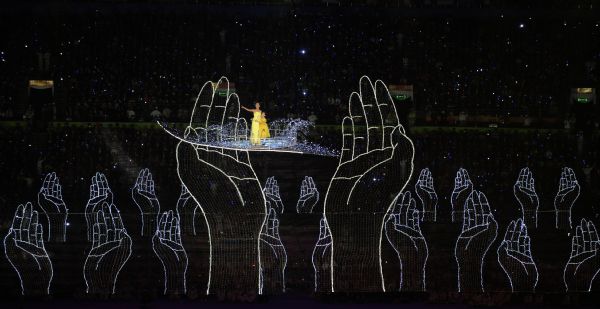Para games add to harmony in Asia
 |
|
Photo taken on Dec. 12, 2010, shows the opening ceremony of the 2010 Asian Para Games held in Guangzhou, south China's Guangdong Province. [Xinhua/Lu Hanxin] |
The 16th Asian Games in the Guangdong provincial capital Guangzhou presented audiences with a magnificent sporting feast. Now Asian people's attention will once again be on the booming Pearl River city as the Asian Para Games began on Sunday.
The Guangzhou Asian Para Games is the second major sports event for disabled athletes in China after the 2008 Beijing Paralympics.
The Asian Para Games was previously known as the Far East and South Pacific Games for the Disabled (FESPIC). In 2006, the Asian Paralympic Committee was set up to push forward the development of sports for disabled people in Asia and help boost their social status. The same year, the committee decided to change the FESPIC into an event for disabled athletes in Asia and chose Guangzhou as the host for its first games.
Ever since, the millennium-old port has been carrying Asian disabled people's sporting dreams under the slogan "we cheer, we share, we win".
Guangzhou has been striving to develop the regional Asian Para Games into a grand event which all people can enjoy. The gathering of disabled athletes and non-disabled people from across Asia in Guangzhou, where they can cheer together and extend mutual blessings, will be a fitting realization of "Spirit in Motion", the original concept of the Paralympics.
The Guangzhou Asian Para Games is also devoted to driving home the idea that disabled people and non-disabled people are equally privileged both in sports and in social life. Everyone should share the joy, friendship, dreams and success that sport can provide.
The Guangzhou Asian Para Games will be an important stage for the athletes to display "self-esteem, self-confidence, self-striving and self-reliance". In such an event there are no losers and all participants are winners.
The Guangzhou authorities and its residents have made concerted efforts to make the Asian Para Games a resounding success. More than 20,000 slopes have been renovated to make them accessible to wheelchair users. Audible signals have been installed in more than 500 crossings for the convenience of the blind. More than 70 bus stops across the city have been made barrier free and special paths have been paved for the disabled in front of many shops. There are also specially designed ATMs, booths and service stations. A total of 25,000 volunteers have received specialized training to offer assistance to those in need.
At a large charity party held in Guangzhou in early September to mark a 100-day countdown to the games, stars from China, the Republic of Korea (ROK) and Singapore performed, raising more than 30 million yuan for the cause of sports for disabled people.
A number of large enterprises from home and abroad have also supported the event. At a sponsored arts exhibition in Beijing in November, Chinese and ROK disabled artists co-authored a work displaying their common love for life.
Philip Craven, president of the International Paralympic Committee (IPC), has commended Guangzhou's efforts in hosting the event and said he believes the games will be a milestone in the event's history.
Dato' Zainal Abu Zarin, president of the Asian Paralympic Committee, also praised Guangzhou's organizing work, expressing his confidence in the Games' success and its promotion of an inclusive society.
The Guangzhou Asian Para Games will not only help foster a more inclusive society, but also enrich the cooperation among Asian nations and inject new vitality into their bid to construct a harmonious Asia.
We sincerely believe the event will help create a better future for Asia.
 0
0 






